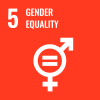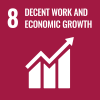Sumy, 3 July 2023 – Blankets, kombucha, toys, oil, soap, shoes. This collection of seemingly unrelated items and more line the shelves of a small shop in Sumy. But there is a common thread between them: industrial hemp.*
Tetiana and Svitlana run their business out of an old textiles factory in war-stricken northeastern Ukraine. From producing blankets to stuffing toys, their team uses hemp fabrics and filler to make the items on display in their shop.

In the shop, customers can find hemp products from several small manufacturers. Photo: IOM/Alisa Kyrpychova

The team is working on a new line of children's bedding sets. Photo: IOM/Alisa Kyrpychova
Sumy – where the business is located – is the Ukrainian region with the longest border with the Russian Federation. Residents have been fleeing areas close to the border since the start of the war because of ceaseless, deadly shelling. Over 80,000 people are displaced throughout the region, many of whom are living in the regional capital city.
Although Sumy city has been affected less directly by the war than the wider region, it can be a challenge for private companies to take the risk of investing in businesses located some 40 kilometres from the border. With business closures, low income and a lack of job opportunities, the local economy has been stagnating.
Yet, despite these challenges and the dangers in the region, the production of hemp, and the surrounding industry, has been gaining momentum. Stigma is fading and more Ukrainians are ready to opt for this sustainable product, without realizing its traditional roots.
Svitlana and Tetiana discovered hemp’s green and economic potential three years ago. Then, in late 2022, the International Organization for Migration (IOM) and the German Government supported their aspirations to open a shop. The women received a business grant which allowed them to purchase equipment like refrigerators, fabric, IT equipment and other items needed to set up their shop.
IOM provides support to small and micro-businesses throughout Ukraine to help lay the foundation for economic recovery. These businesses underpin economic stability, job creation, community resilience, diversification, innovation and economic independence.
“Hemp is a very underrated crop, but it is our historical and national treasure. We want to revive it,” says Tetiana, who was excited to expand her three-person team by one, thanks to the grant. Contributing to job retention and creation is vital during difficult times. The war has led to displacement and job losses, making it even more crucial to support small businesses as a means of creating new employment opportunities.
The invention of synthetic materials, the rise of anti-drug movements and the subsequent UN ban of cannabis in 1961 led to the decline of hemp production over the past few decades. With the discovery of non-narcotic hemp cultivars, society is rediscovering the plant as an eco-solution for the environmental impacts of the textile industry, while bringing employment and other economic benefits to Ukraine.
The hemp Svitlana and Tetiana use is grown locally, and every part of the eco-friendly plant can be used. The stalks can be transformed into hemp blocks for construction, yarn is made from the stems and hemp seeds are used to make oil, which can be further reworked into soap and detergent. Hemp requires low or no pesticides and it can be used for crop rotation, to replenish soil and for carbon absorption.
Tetiana wants to make this climate-warrior plant famous: “Ukrainian grandmothers used to make fabric or towels from hemp.”
Her team even made a bag from 70-year-old hemp yarn – part of a limited-edition line created to celebrate the historical heritage of Sumy Region.
The production cycle of their business is also zero waste and was one of the factors IOM considered when selecting grantees. From leftovers of fabrics, the team makes patchwork quilts or sends them to a woman in Kherson, who sews toys. Recycled paper is always used to package their items.
“IOM is proud to support small enterprises across Ukraine. In Sumy Region, 37 businesses received grants helping them not only to stay afloat but also create new job opportunities for locals and displaced people alike,” says Michael Newson, Senior Programme Coordinator at IOM Ukraine.

Hemp has been cultivated and used in the textile industry in Ukraine for centuries. Photo: TetianaMoyseienko
There is still some public stigma attached to industrial hemp, as it come from the same plant as cannabis. So besides running her business, Tetiana gives public lectures and raises awareness of hemp’s benefits and its hidden opportunities for green economy in her region.
In the shop, customers can find dozens of products from hemp made by the team, as well as other small hemp manufacturers working from across Ukraine. This cooperation helps them to stay afloat during the economic turmoil.
Small businesses play a vital role in any economy, and Ukraine is no exception. During times of conflict, the economy suffers, and small businesses are particularly vulnerable to the negative impacts. By supporting them, one helps maintain economic stability and provide livelihoods for entrepreneurs, their employees, and their families. This stability can have a ripple effect on the overall economy, helping to prevent further economic decline.
Supporting small businesses promotes economic independence and reduces dependency on external aid. Empowering entrepreneurs and business owners enables them to support themselves and contribute to the local economy. This can have long-term benefits by fostering self-sufficiency and reducing reliance on external assistance. IOM partners with businesses to help build a better today and tomorrow for Ukraine.

Hemp filler is used for pillows, blankets and toys. Photo: IOM/Alisa Kyrpychova
*Industrial hemp does not have any intoxicating properties and is legal in Ukraine.
This story was written by Alisa Kyrpychova and Olivia Headon from IOM Ukraine.



